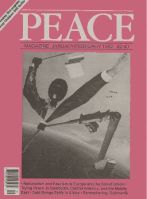
Peace Magazine Jan-Feb 1992, page 29. Some rights reserved.
Search for other articles by Gideon Forman here
Thomas L Perry, M.D. (editor); Peacemaking in the 1990s: a Guide for Canadians
A collection of essays by activists and academics, Peacemaking in the 1990s: A Guide for Canadians sets forth a variety of military-related problems-nuclear energy, under-development and war in the Third World, environmental ruin-and strives to articulate positive responses.
The stark statistic are well-known: for just half of the world's annual military spending, 1.6 billion people in the Third World could have safe water; for the amount spent in two minutes, 3.5 million children dying from dehydration could be saved.
The volume makes clear that not only are the big players guilty, but Canada too. Pratt and Whitney motors power helicopter gunships which kill Guatemalan villagers. Our federal government tests General Motors sell Light Armoured Vehicles to Indonesia-a country whose war-making has killed or injured 500,000 East Timorese.
But numbers do little to move us. The book conveys the horror of war best when it presents the personal account: Mitsue Kube's description of surviving the A-bomb; Faisa's unbearable story of her Somalian family's annihilation; tales of Nicaraguan anguish. One woman recalls that the contras called his mother "a stupid old woman and blew her face off." These recollections remind us that, recent changes notwithstanding, the tendency of our world is hardly pacific. The peace movement is still vitally important.
What sort of projects should the movement undertake? Peacemaking is valuable for its concrete recommendations: mobilize public support against the Defence Industry Productivity Program-a $250 million annual hand out to arms makers-and back a comprehensive nuclear test ban. Joanna Santa Barbara, president of Canadian Physicians for the Prevention of War, believes peacemaking can be taught within the family. She outlines an approach to child rearing, one which centres on reasoning with children, and offers specific suggestions, such as the use of cooperative games.
This is a book able to face tremendous darkness, and remain hopeful because there is no choice.
Gideon Forman is coordinator of the Canadian Peace Alliance.

Peace Magazine Jan-Feb 1992, page 29. Some rights reserved.
Search for other articles by Gideon Forman here